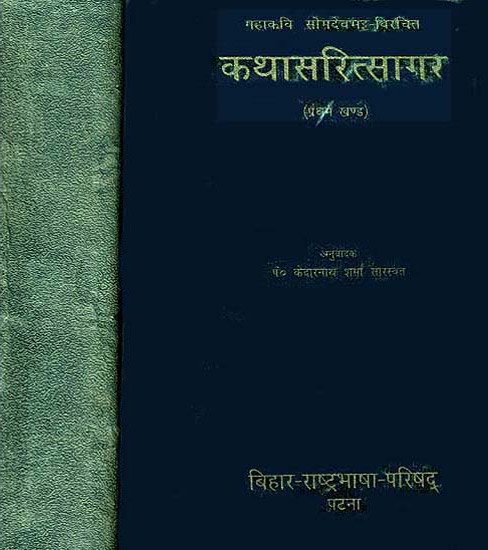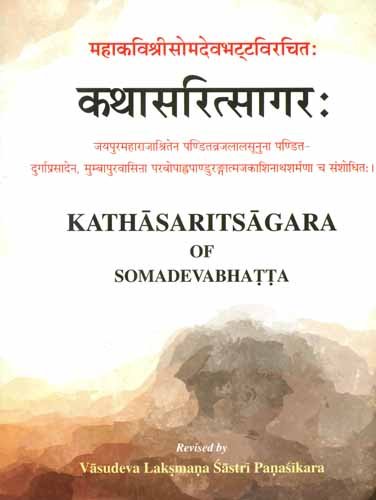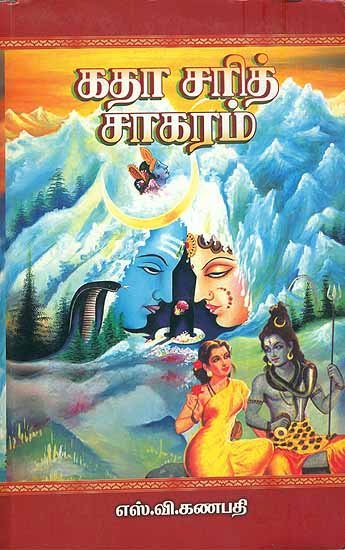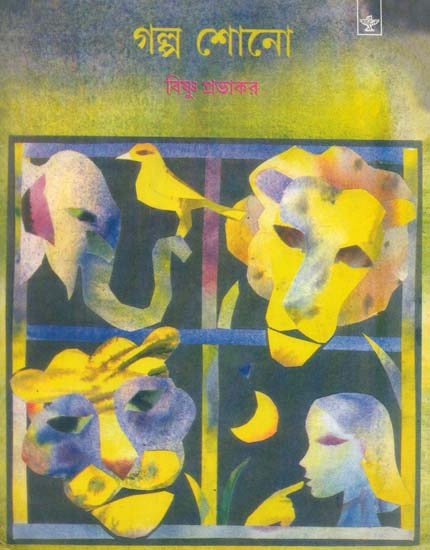Kathasaritsagara [sanskrit]
by C. H. Tawney | 2014 | 226,424 words | ISBN-13: 9789350501351
The Sanskrit edition of the Kathasaritsagara referencing the English translation and grammatical analysis. Written by Somadeva and dating from the 12th century, the Kathasaritsagara (or Katha-sarit-sagara) represents an epic legend narrating the adventures of Naravahanadatta as he strives to become the destined emperor of the Vidyadharas. Alternative titles: (Kathāsaritsāgara, कथासरित्सागर, Kathā-sarit-sāgara)
Verse 12.36.209
चिरकाङ्क्षितमन्वभूच् च मा मेत्य् अलमल्पोच्चरदक्षरं स तस्याः ।
नवमोहनमन्त्रसारसौख्यं त्रुटितस्फारमहार्हरत्नकाञ्चि ॥ २०९ ॥
cirakāṅkṣitamanvabhūc ca mā mety alamalpoccaradakṣaraṃ sa tasyāḥ |
navamohanamantrasārasaukhyaṃ truṭitasphāramahārharatnakāñci || 209 ||
The English translation of Kathasaritsagara Verse 12.36.209 is contained in the book The Ocean of Story by C.H. Tawney. This book is available online or you could buy the latest edition:
Read online Buy now! The English translation by C.H. Tawney (2014)
Glossary of Sanskrit terms
Note: This extracts Sanskrit terms and links to English definitions from the glossary, based on an experimental segmentation of verse (12.36.209). Some terms could be superfluous while some might not be mentioned. Click on the word to show English definitions.
Cira, Kankshita, Anu, Alam, Ala, Alpa, Ucca, Rada, Kshara, Navama, Uhana, Antra, Sarasa, Saras, Aukhya, Trutita, Sphara, Aha, Arha, Ratna, Kanci,
Analysis of Sanskrit grammar
Note: this is an experimental feature and only shows the first possible analysis of the Sanskrit text (Kathasaritsagara Verse 12.36.209). If the system was successful in segmenting the sentence, you will see of which words it is made up of, generally consisting of Nouns, Pronouns, Verbs, Participles and Indeclinables. Click on the link to show all possible derivations of the word.
- Line 1: “cirakāṅkṣitamanvabhūc ca mā mety alamalpoccaradakṣaraṃ sa tasyāḥ ”
- cira -
-
cira (noun, masculine)[compound], [vocative single]cira (noun, neuter)[compound], [vocative single]
- kāṅkṣitam -
-
kāṅkṣita (noun, masculine)[adverb], [accusative single]kāṅkṣita (noun, neuter)[adverb], [nominative single], [accusative single]kāṅkṣitā (noun, feminine)[adverb]√kāṅkṣ -> kāṅkṣita (participle, masculine)[accusative single from √kāṅkṣ class 1 verb]√kāṅkṣ -> kāṅkṣita (participle, neuter)[nominative single from √kāṅkṣ class 1 verb], [accusative single from √kāṅkṣ class 1 verb]
- anva -
-
anu (indeclinable adverb)[indeclinable adverb]anu (indeclinable preposition)[indeclinable preposition]anu (noun, masculine)[compound], [adverb], [nominative dual], [vocative dual], [accusative dual]anu (noun, neuter)[compound], [adverb], [nominative single], [vocative single], [accusative single]anu (noun, feminine)[compound], [adverb], [nominative dual], [vocative dual], [accusative dual]anu (Preverb)[Preverb]
- abhūc -
-
√bhū (verb class 1)[aorist active third single]
- ca -
-
ca (indeclinable conjunction)[indeclinable conjunction]ca (noun, masculine)[compound], [vocative single]ca (noun, neuter)[compound], [vocative single]
- mā* -
-
- Cannot analyse mety*al
- alam -
-
alam (indeclinable)[indeclinable]ala (noun, neuter)[adverb], [nominative single], [accusative single]
- alpo -
-
alpa (noun, masculine)[compound], [vocative single]alpa (noun, neuter)[compound], [vocative single]alpā (noun, feminine)[nominative single]
- ucca -
-
ucca (noun, masculine)[compound], [vocative single]ucca (noun, neuter)[compound], [vocative single]
- rada -
-
rada (noun, masculine)[compound], [vocative single]rada (noun, neuter)[compound], [vocative single]√rad (verb class 1)[imperative active second single]
- kṣaram -
-
kṣara (noun, masculine)[adverb], [accusative single]kṣara (noun, neuter)[adverb], [nominative single], [accusative single]kṣarā (noun, feminine)[adverb]
- sa -
-
sa (noun, neuter)[compound], [vocative single]sa (noun, masculine)[nominative single]
- tasyāḥ -
-
sā (noun, feminine)[ablative single], [genitive single]
- Line 2: “navamohanamantrasārasaukhyaṃ truṭitasphāramahārharatnakāñci ”
- navamo -
-
navama (noun, masculine)[compound], [vocative single]navama (noun, neuter)[compound], [vocative single]navamā (noun, feminine)[nominative single]
- ūhanam -
-
ūhana (noun, neuter)[adverb], [nominative single], [accusative single]
- antra -
-
antra (noun, neuter)[compound], [vocative single]
- sārasau -
-
sārasa (noun, masculine)[compound], [nominative dual], [vocative single], [vocative dual], [accusative dual]sārasa (noun, neuter)[compound], [vocative single]sārasā (noun, feminine)[nominative single]sāras (noun, neuter)[instrumental single]
- aukhyam -
-
aukhya (noun, masculine)[adverb], [accusative single]aukhya (noun, neuter)[adverb], [nominative single], [accusative single]aukhyā (noun, feminine)[adverb]
- truṭita -
-
truṭita (noun, masculine)[compound], [vocative single]truṭita (noun, neuter)[compound], [vocative single]√truṭ -> truṭita (participle, masculine)[vocative single from √truṭ class 4 verb], [vocative single from √truṭ class 6 verb]√truṭ -> truṭita (participle, neuter)[vocative single from √truṭ class 4 verb], [vocative single from √truṭ class 6 verb]
- sphāram -
-
sphāra (noun, masculine)[adverb], [accusative single]sphāra (noun, neuter)[adverb], [nominative single], [accusative single]sphārā (noun, feminine)[adverb]
- ahā -
-
aha (noun, neuter)[compound], [vocative single]
- arha -
-
arha (noun, masculine)[compound], [vocative single]arha (noun, neuter)[compound], [vocative single]√arh (verb class 1)[imperative active second single]
- ratna -
-
ratna (noun, masculine)[compound], [vocative single]ratna (noun, neuter)[compound], [vocative single]
- kāñci -
-
kāñci (indeclinable)[indeclinable]kāñci (noun, feminine)[compound], [adverb]kāñci (noun, masculine)[compound], [adverb]kāñcī (noun, feminine)[adverb], [vocative single]
Other editions:
Also see the following editions of the Sanskrit text or (alternative) English translations of the Kathasaritsagara Verse 12.36.209
Kathasaritsagar
by Kedarnath Sharma Saraswat (2005)
The Only Edition with the Sanskrit Text and its Hindi Translation (An Old and Rare Book) Set of 3 Vol.
Buy now!
Kathasaritsagara of Somadeva Bhatta (Sanskrit Text Only)
by Vasudeva Laksmana Sastri (2013)
Katha Sarit Sagar in Marathi
by H. A Bhave (1995)
Set of 5 Volumes; Published by Varada Books, Pune. 2256 pages (Throughout B/W Illustrations).
Buy now!
Katha Sarit Sagara (Tamil)
by S. V. Ganapati (எஸ். வி. கணபதி) (2014)
[கதா சரித் சாகரம்] Published by Alliance Publications.
Buy now!
Galpa Shono
by Abhijit Chattopadhyay (2014)
[গল্প শোনো] Galpa Shono: Bengali Translation of 'Suno Kahani From Katha Sarit Sagar'; 9788126015436; Published by Sahitya Akademi, Delhi.
Buy now!Preview of verse 12.36.209 in Bengali sript:
চিরকাঙ্ক্ষিতমন্বভূচ্ চ মা মেত্য্ অলমল্পোচ্চরদক্ষরং স তস্যাঃ ।
নবমোহনমন্ত্রসারসৌখ্যং ত্রুটিতস্ফারমহার্হরত্নকাঞ্চি ॥ ২০৯ ॥
![Kathasaritsagara [sanskrit] - book cover](/uploads/a/Katha-Sarit-Sagara.jpg)




